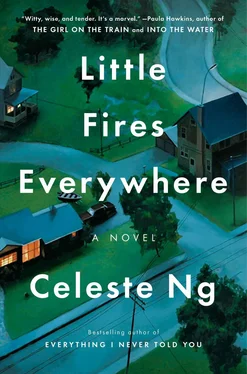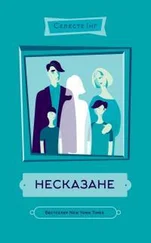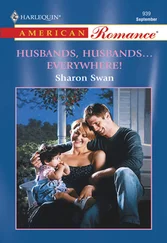College applications had been increasingly on Lexie’s mind. Shaker took college seriously: the district had a ninety-nine percent graduation rate and virtually all the kids went on to college of some kind. Everyone Lexie knew was applying early and, as a result, all anyone could talk about in the Social Room was who was applying where. Serena Wong was applying to Harvard. Brian, Lexie said, had his heart set on Princeton. “Like Cliff and Clair would let me go anywhere else,” he’d said. His parents were really named John and Deborah Avery, but his father was a doctor and his mother was a lawyer and, truth be told, they did exude a certain Cosbyish vibe, his father sweatered and affable and his mother wittily competent and no-nonsense. They’d met at Princeton as undergraduates, and Brian had pictures of himself as a baby in a Princeton onesie.
For Lexie, the precedent was not quite so clear: her mother had grown up in Shaker and had never gone far—just down to Denison for her undergrad before boomeranging back. Her father had come from a small town in Indiana and, once he’d met her mother at college, simply stayed, moving back with her to her hometown, finishing a JD at Case Western, working his way up from a junior associate to partner at one of the biggest firms in the city. But Lexie, like most of her classmates, had no desire to stay anywhere near Cleveland. It huddled on the edge of a dead, dirty lake, fed by a river best known for burning; it was built on a river whose very name meant sadness: Chagrin. Which then gave its name to everything, pockets of agony scattered throughout the city, buried like veins of dismay: Chagrin Falls, Chagrin Boulevard, Chagrin Reservation. Chagrin Real Estate. Chagrin Auto Body. Chagrin reproducing and proliferating, as if they would ever run short. The Mistake on the Lake, people called it sometimes, and to Lexie, as to her siblings and friends, Cleveland was something to be escaped.
As the deadline for early applications approached, Lexie had decided to apply early to Yale. It had a good drama program, and Lexie had been the lead in the musical last year, even though she’d only been a junior. Despite her air of frivolity, she was near the top of her class—officially, Shaker did not rank its students, to reduce competitive feelings, but she knew she was somewhere in the top twenty. She was taking four AP classes and served as secretary of the French Club. “Don’t let the shallowness fool you,” Moody had told Pearl. “You know why she watches TV all afternoon? Because she can finish her homework in half an hour before bed. Like that.” He snapped his fingers. “Lexie’s got a good brain. She just doesn’t always use it in real life.” Yale seemed a stretch but a distinctly possible one, her guidance counselor had said. “Plus,” Mrs. Lieberman had added, “they know kids from Shaker always go on to do well. They’ll give you an edge.”
Lexie and Brian had been together since junior year, and she liked the idea of being just a train ride away. “We can visit each other all the time,” Lexie pointed out to him as she printed the Yale early application. “And we can even meet up in New York.” It was this last that finally swayed her: New York, which had exuded a glamorous pull on her imagination ever since she’d read Eloise as a child. She didn’t want to go to school in New York; her guidance counselor had floated the idea of Columbia, but Lexie had heard the area was sketchy. Still, she liked the idea of being able to jaunt in for a day—a morning at the Met looking at art, maybe a splurge at Macy’s or even a weekend away with Brian—and then zip away from the crowds and the grime and the noise.
Before any of that could happen, though, she had to write her essay. A good essay, Mrs. Lieberman had insisted, was what she needed to set herself apart from the pack.
“Listen to this dumbass question,” she groaned that afternoon in Pearl’s kitchen, fishing the printed-out application from her bag. “‘Rewrite a famous story from a different perspective. For example, retell The Wizard of Oz from the point of view of the Wicked Witch.’ This is a college app, not creative writing. I’m taking AP English. At least ask me to write a real essay.”
“How about a fairy tale,” Moody suggested. He looked up from his notebook and the open algebra textbook before him. “‘Cinderella’ from the point of view of the stepsisters. Maybe they weren’t so wicked after all. Maybe she was actually a bitch to them .”
“‘Little Red Riding Hood’ as told by the wolf,” Pearl suggested.
“Or ‘Rumpelstiltskin,’” Lexie mused. “I mean, that miller’s daughter cheated him. He did all that spinning for her and she said she’d give him her baby and then she reneged on their deal. Maybe she’s the villain here.” With one maroon fingernail she tapped the top of the Diet Coke she’d bought just after school, then popped the tab. “I mean, she shouldn’t have agreed to give up her baby in the first place, if she didn’t want to.”
“Well,” Mia put in suddenly. She turned around, the bowl of popcorn in her hands, and all three of them jumped, as if a piece of furniture had begun to speak. “Maybe she didn’t know what she was giving up until afterward. Maybe once she saw the baby she changed her mind.” She set the bowl down in the center of the table. “Don’t be too quick to judge, Lexie.”
Lexie looked chastened for an instant, then rolled her eyes. Moody darted a look at Pearl: See how shallow? But Pearl didn’t notice. After Mia had gone back into the living room—embarrassed at her outburst—she turned to Lexie. “I could help you,” she said, quietly enough that she thought Mia could not hear. Then, a moment later, because this did not seem like enough, “I’m good at stories. I could even write it for you.”
“Really?” Lexie beamed. “Oh my god, Pearl, I’ll owe you forever.” She threw her arms around Pearl. Across the table, Moody gave up on his homework and slammed his math book shut, and in the living room, Mia jammed her paintbrush into a jar of water, lips pursed, paint scrubbing from the bristles in a dirt-colored swirl.
Pearl, true to her word, handed Lexie a typed-up essay the next week—the story of the frog prince, from the point of view of the frog. Neither Mia, who did not want to admit she’d been eavesdropping, nor Moody, who did not want to be labeled a goody two-shoes, said a word about it. But both were growing increasingly uneasy.
When Moody arrived in the morning so they could walk to school together, Pearl would emerge from her room wearing one of Lexie’s button-downs, or a spaghetti-strap tank, or dark red lipstick. “Lexie gave it to me,” she explained, half to her mother and half to Moody, both of whom were staring at her in dismay. “She said it was too dark for her, but that it looked good on me. Because my hair’s darker.” Under the smudge of lipstick, her lips looked like a bruise, tender and raw.
“Wash that off,” Mia said, for the first time ever. But the next morning Pearl came out wearing one of Lexie’s chokers, which looked like a gash of black lace around her neck.
“See you at dinner,” she said. “Lexie and I are going shopping after school.”
By late October, as one by one applications were sent in, a spirit of celebration set in among the seniors. Lexie’s application had been submitted, and she was in a benevolent mood. Her essay—thanks to Pearl—was good, her SAT scores were strong, her GPA was over 4.0 thanks to her AP classes, and she could already picture herself on Yale’s campus. She felt she should reward Pearl in some way for her assistance and, after some thought, came up with the perfect idea: something she was sure Pearl would love, but would never get invited to on her own. “Stacie Perry’s having a party this weekend,” she said. “Want to come?”
Читать дальше












